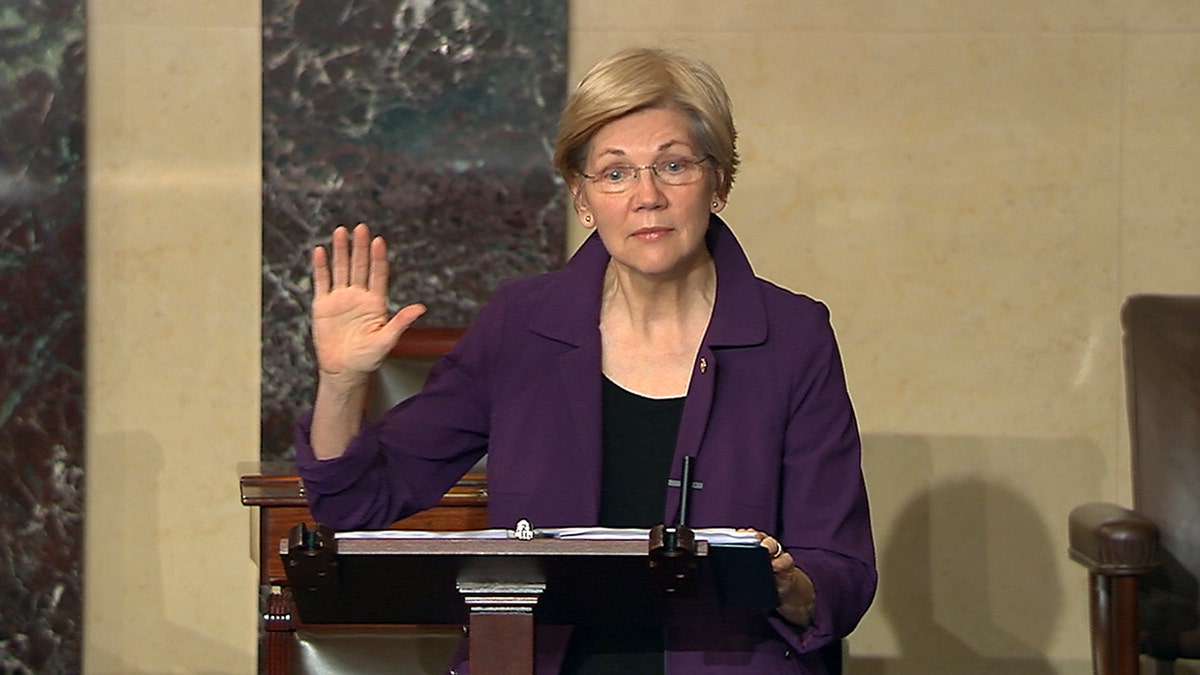
Feb. 6, 2017: Sen. Elizabeth Warren, D-Mass., speaks on the floor of the U.S. Senate in Washington about the nomination of Betsy DeVos to be Education Secretary. (Senate TV/AP)
Sen. Elizabeth Warren, D-Mass., was prohibited Tuesday night from speaking on the Senate floor for the rest of the debate over Sen. Jeff Sessions' nomination to be attorney general.
The drama began when Warren, quoting a 30-year-old letter by civil rights leader Coretta Scott King, referred to the Alabama Republican as a "disgrace." King's letter was written in 1986, when Sessions was nominated to the federal bench but was never confirmed.
King, the widow of Martin Luther King Jr., also wrote that when acting as a federal prosecutor, Sessions used his power to "chill the free exercise of the vote by black citizens."
Warren's reference drew the ire of Senate Majority Leader Mitch McConnell, R-Ky., who said that Warren had "impugned the motives of our colleague from Alabama."
Sen. Steve Daines, R-Mont. advised Warren that she was out of order under Rule XIX of the Senate, which states that "no Senator in debate shall, directly or indirectly, by any form of words impute to another Senator or to other Senators any conduct or motive unworthy or unbecoming a Senator."
"I'm reading a letter from Coretta Scott King to the Judiciary Committee from 1986 that was admitted into the record," Warren argued. "I'm simply reading what she wrote about what the nomination of Jeff Sessions to be a federal court judge meant and what it would mean in history for her."
After a few parliamentary moves, McConnell called for a vote to affirm Daines' ruling that Warren was out of order. The GOP-controlled Senate backed him up, 49-43, before defeating a Democratic effort to restore Warren's speaking privileges, 50-43.
"She was warned, she was given an explanation," McConnell said of Warren. "Nevertheless, she persisted."
Democrats seized on the flap to charge that Republicans were muzzling Warren, sparking liberals to take to Twitter to post the King letter in its entirety. Warren herself issued a statement vowing that she "will not be silent while the Republicans rubber stamp an Attorney General who will never stand up to President Trump when he violates the Constitution or breaks the law."
Senate Minority Leader Charles Schumer, D-N.Y., said in a statement that McConnell's action was "selective enforcement" of Rule XIX.
"Senate Republicans have regularly flaunted Rule XIX in the past – but Republicans never asked them to sit down," said Schumer, who went on to point out that McConnell didn't object when Sen. Ted Cruz, R-Texas, called him a liar in a 2015 dustup.
The episode was followed by lamentations by Senate veterans over the chamber's increasingly partisan nature.
"I think we ought to be ashamed of each other," said Sen. Orrin Hatch, R-Utah, the Senate's most senior Republican. "Everything doesn't have to lead to a fight on the floor."
"We've got to grow up [and] take stock of ourselves," Hatch added, before warning that "this place is going to devolve into nothing but a jungle."
Sessions is expected to be confirmed when the full Senate votes on his nomination later this week.
Fox News' Chad Pergram and the Associated Press contributed to this report.











































